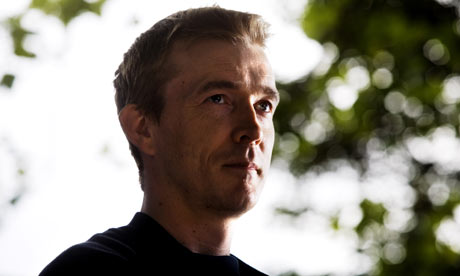
I couldn't make the highly scientific meeting that determined who of us would blog on which year, so I landed 2004. Lucky for me: it means I can rave on about David Mitchell's Cloud Atlas which came out this year and was robbed (robbed, I tell you!) of the Booker by Alan Hollinghurst's (admittedly also rather good) The Line of Beauty. More on Hollinghurst later; indulge me for a moment while I revisit Cloud Atlas.
David Mitchell's dazzling third novel features six interlinked first-person narratives that move through different times and genres and yet, somehow, wrap up into a complete narrative that's far more than the sum of its distinctive parts. As Mitchell put it, "having sacrificed chronology, it's important to unify the disparate parts with a theme. Using a music analogy, Cloud Atlas works as different variations on a theme played on different instruments." Or, as AS Byatt put it in her review, it's "a thrilling rollercoaster ride that you don't want to get off". [3]
It was the hot favourite for the Booker but lost out to a worthy winner - The Line of Beauty - in what was a pretty strong and uncontroversial year for the prize. Hollinghurst's satire tells the story of the lives, loves and postgraduate studies of gay antihero Nick Guest against the wider political backdrop of Thatcher's Britain. While admiring the acute social observation, some reviewers found the sex-and-drugs scenes a bit icky - but, as the Observer's Alfred Hickling suggested, "even if you skip the sex and the snorting there's plenty left to enjoy".
Skipping the sex was also recommended for Tom Wolfe's I Am Charlotte Simmons which won the bad sex award for its embarrassingly dreadful description of the eponymous heroine's loss of her virginity. The novel became even less endearing, were that possible, with the news that it was George W Bush's choice of holiday reading.
Moving swiftly on, there was a Henry James theme to 2004. The Line of Beauty's Nick Guest, is writing a thesis on the American, and in the Booker shortlist Hollinghurst's novel was also up against Colm Tóibín's accomplished fictional portrait of Henry James, The Master.
Andrea Levy's Small Island was an unexpected (she beat Margaret Atwood's Oryx and Crake and Rose Tremain's The Colour) but well-deserved winner of the Orange prize. Mike Phillips called it Levy's "big book" and I have to agree – it's a gripping, thoughtful read. However, I can't pass judgment on 2004's other "big book" - Susannah Clarke's 900-page monster, Jonathan Strange and Mr Norrell. I have to confess that the doorstopper has spent the last five years undisturbed on my bookshelf, inducing guilt every time I glance at it as I'm suspect that, could I only summon the energy to lift it off the shelf and make a start, I might enjoy it. Not everyone did, though: the Guardian review deemed it "as insubstantial as fairy gold" while for Michel Faber "this large, loquacious book has nothing much to say, the plot creaks frightfully in many places and the pace dawdles."
Philip Roth's The Plot Against America won plaudits, as did How Mumbo-Jumbo Conquered the World: A Short History of Modern Delusions by Francis Wheen and the first volume of Bob Dylan's Chronicles.
Finally, two fantastic children's authors sprang on to the scene this year. Meg Rosoff won the Guardian children's fiction prize (and the Whitbread) with her wonderful and unconventional tale of two cousins falling in love and being divided by war, How I Live Now. Michelle Paver launched the first book in her bestselling Chronicles of Ancient Darkness series, Wolf Brother, introducing her Paleolithic world and characters Torak, Wolf and Renn. Neatly, the series wound up this year with the sixth book, Ghost Hunter.
So tell me: which was your favourite book of 2004, and who have I missed out? For memory-jogging purposes, Wikipedia's account of 2004 in literature, and our own critics' picks of the year provide some useful reminders.







